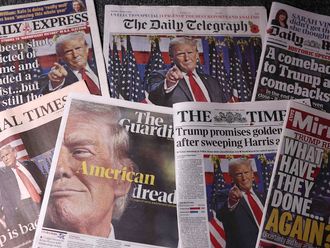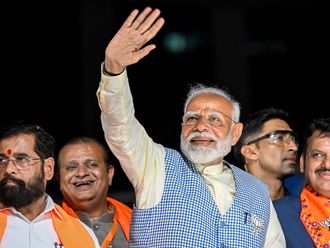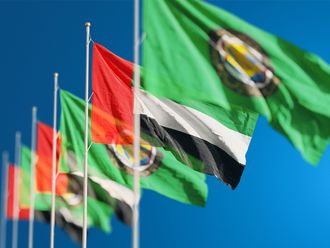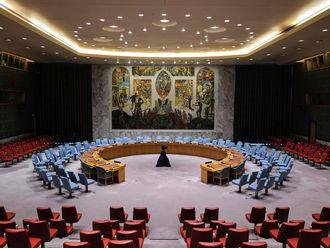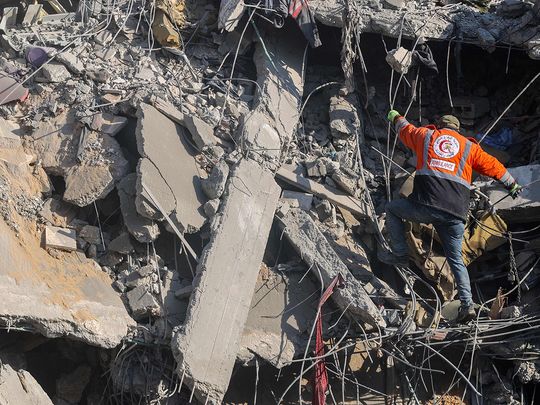
“Imperialism leaves behind germs of rot which we must clinically detect and remove from our land but from our minds as well,” Frantz Fanon wrote in ‘The Wretched of the Earth’.
What the iconic anti-colonial philosopher and psychiatrist was essentially arguing is that the mind must be decolonised first, in order for the undoing of colonialism to succeed in all aspects of our liberation.
Many in the Global South, but especially intellectuals and analysts concerned with Middle Eastern affairs, are still struggling with their relationship with the United States.
Though all signs indicate decline of US global status, many among our intelligentsia, possibly unwittingly, still believe that Washington holds all the cards, and that any US administration that controls the White House naturally must also rule the world.
Of course, US domestic and foreign policies are relevant to global affairs, as financial decisions by the US Federal Reserve, for example, will affect US-global trade volumes, and will impact the interest or disinterest in purchasing US treasury bonds. Some countries that are keen on standing at an equal distance between the US and China often jockey to refine their positions and to protect themselves in case of seismic political changes in the US. And more …
Desensitisation and opportunism
However, the vibe radiating from many in the Middle East is that the doomsday scenario is real, and that the big war is upon us. They ignore that, for many nations around the world, from Gaza, to Lebanon, to Ukraine, and elsewhere, wars have already arrived, many of which are bankrolled by western funds and political blank checks.
To warn of war while tens of millions are already suffering the outcomes of these western-funded wars reflects the degree of desensitisation and opportunism of the followers of western order.
Some of those crying over the supposedly imminent doom had initially presented the Democratic Party’s presidential nominee, Kamala Harris, as the best worst-case scenario for Palestinians, Arabs and Muslims. Though they may have acknowledged the genocide in Gaza, and even criticised the Joe Biden Administration for enabling it, they recoiled at the mere suggestion that the Democrats must be punished for their many sins in the Middle East and beyond.
Another crowd presented Donald Trump as a saviour, the strong man who, with a stroke of a pen, will end all wars, Gaza included. They cited the man’s repeated emphasis that “I’m not going to start a war, I’m going to stop the wars.” They even went on to argue that Trump, who would be serving a second and final term in office, is now immune to the political manipulation from the pro-Israeli lobby, and all other pressures.
Trump won. His crushing defeat of the Democrats on all fronts, including that of the popular vote, indicates that he would have won regardless of those who considered ending war on Gaza a top political priority. But the early announcements that Trump’s future administration will include the who’s who in the pro-Israel Republican circle reignited fearmongering tactics.
Pro-Israeli political allegiances
However, both sides of this inconsequential debate conveniently ignore obvious facts, that America’s ruling elites are rooted in pro-Israeli political allegiances; that though there might be a difference in style, US foreign policy remains identical; that the Biden-Harris administration have given Israel all the help it needed to sustain its wars in the Middle East over the course of 13 months and counting.
This stifling debate, however, misses some of the most critical points that should be discussed, and urgently so.
First, the Middle East region is not a single political monolith. It has its own political calculations, conflicts, alliances and options that include other political heavyweights such as China, Russia, among others.
Second, that several Middle Eastern countries are joining the increasingly influential BRICS alliance. The latter is not just a trade club, but a powerful economic alliance with a strong political discourse to match. Thus, the future and survival of the Middle East does not hinge on US economic policies.
Third, that the war in Gaza is a war that also involves the Palestinians, the Lebanese and their Arab and international allies. The people of occupied Palestine and Lebanon have agency, choices and strategies that are not wholly dependent on the ideological identity or political inclinations of a lone American man dwelling in the White House.
If the political views of the American president were indeed the most decisive aspect in the fate and future of the Palestinian people, Palestinian aspirations would have been suppressed decades ago due to the inherent US pro-Israeli bias. They didn’t, not due to the compassion of US administrations, but due to the sumoud, the resilience of the Palestinian people.
It is time that we abandon the archaic thinking regarding our collective colonial past, or present, that saw western leaders as masters, and our peoples as mere subjects, struggling to survive, imploring, though never obtaining, prudent western foreign policies.
The world is vastly changing, and it is time for us to change as well. Fanon had already discovered the cure: We must clinically detect and remove the rot, not only from our land but from our minds as well.
— Dr. Ramzy Baroud is a journalist, author and editor


